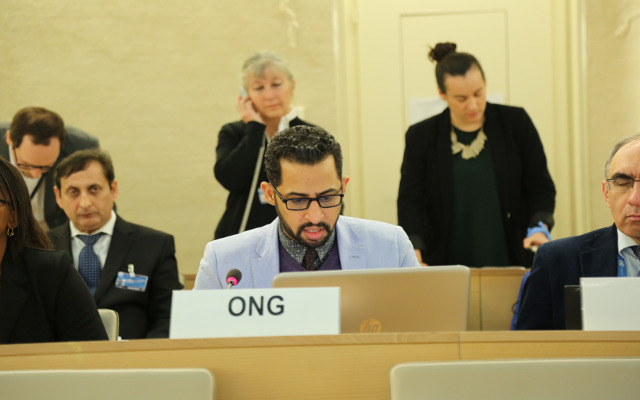On 3 March 2017, Yusuf al-Hoori delivered an oral intervention at the 34th session of the Human Rights Council. He participated in the Item 3 Interactive Dialogue with the Special Rapporteur on Torture and the Special Rapporteur on Human Rights Defenders, delivering an oral intervention addressing the situation of human rights defenders and the systematic use of torture by government officials. Please continue reading for full remarks or click here to download a PDF.
Mr. President,
Alsalam Foundation, together with Americans for Democracy & Human Rights in Bahrain and the Bahrain Institute for Rights & Democracy welcomes the reports of the two Rapporteurs.
The concerns expressed by Rapporteur Forst on the increasingly challenging environment for HRDs, are reflected in the ongoing crackdown on civil society in Bahrain. Just weeks ago, leading Bahraini HRD Nabeel Rajab attended yet another hearing on charges relating to his peaceful human rights activities. He faces up to 18 years imprisonment.
Meanwhile, the Government continues to arbitrarily detain other HRDs, including Abdulhadi Al-Khawaja, Abduljalil Al-Singace and Naji Fateel. Others have been forced into exile, like Zainab Al-Khawaja. In light of these alarming reprisals that require greater country-specific attention, we strongly support the Rapporteur’s suggestion to update the 2006 report on the Situation of Human Rights Defenders in 118 countries.
We also support the suggestion of Rapporteur Melzer to examine extra-custodial uses of force and his plans to consider how certain weapons and riot control devices and methods of law enforcement would be considered cruel, inhuman or degrading.
In Bahrain, the use of excessive force is widespread and systematic. Authorities often deploy excessive tear gas to shut down peaceful protests in a way that could easily be described as cruel, inhuman or degrading. This has resulted in several deaths due to tear gas inhalation, including of an 8-year old child and a young infant. Authorities also shoot tear gas canisters at short-range, causing long-term injuries, like vision impairment, as in the case of Bahraini male citizen Yousif Badah. Authorities regularly use birdshot against protesters, sometimes resulting in serious internal injury and even death.
We ask Rapporteur Melzer: What responsibility do arms exporting states have to ensure that weapons and riot control devices are not causing cruel, inhuman or degrading treatment?
Thank you





